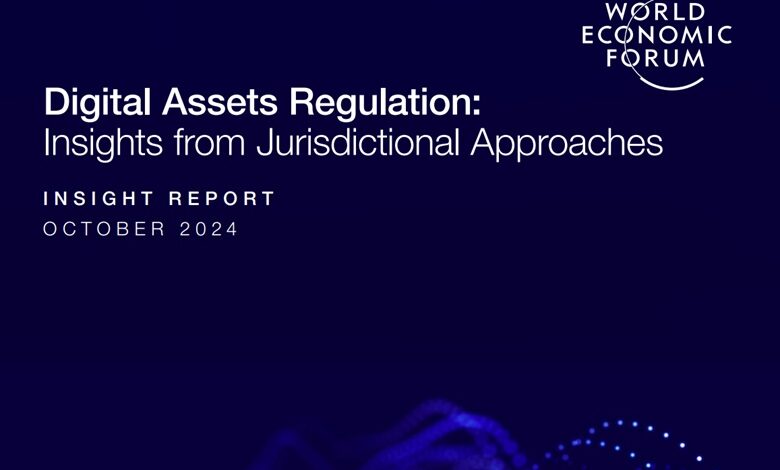Key Insights from WEF’s Digital Assets Regulation Report
UAE Leads Digital Asset Regulation as Global Cooperation Becomes Critical

The World Economic Forum’s Digital Assets Regulation Insight Report (October 2024) provides a comprehensive examination of the global landscape for digital asset regulation. The report highlights the varied approaches that jurisdictions are taking to regulate emerging technologies like cryptocurrencies, stablecoins, and decentralized finance (DeFi). It focuses on nine leading jurisdictions: the European Union, UAE, United States, Gibraltar, Hong Kong, Japan, Singapore, Switzerland, and the United Kingdom.
Regulatory Challenges and Solutions
One of the key themes of the report is that the rapidly evolving digital asset space requires clear, robust regulatory frameworks. However, the global regulatory environment is fragmented. While some jurisdictions are pushing forward with comprehensive regulations like the EU’s Markets in Crypto-Assets (MiCA) framework, others are only just beginning to draft rules for these new financial assets.
Anti-Money Laundering (AML) and Know Your Customer (KYC): The report emphasizes the need for enhanced AML and KYC measures. Digital assets, with their pseudonymous nature, have been seen as tools for illicit activity, making this a critical area for regulatory oversight. The report calls for the adoption of technology-enhanced AML/KYC solutions, global cooperation, and continuous compliance training for market participants.
Regulatory Sandboxes: Several jurisdictions, like Singapore and the UAE, are utilizing regulatory sandboxes to encourage innovation while ensuring regulatory oversight. Sandboxes allow digital asset companies to test new products in a controlled environment under the supervision of regulators. This has become an essential tool for balancing innovation with the need for oversight.
The Role of DeFi and Emerging Technologies
As DeFi (Decentralized Finance) continues to grow, the report stresses that tailored licensing models are crucial for integrating DeFi within traditional regulatory frameworks. The decentralized nature of these technologies introduces significant risks, such as lack of consumer protection, which many regulators are struggling to address. The report calls for regulators to adapt their frameworks to allow for DeFi innovation without compromising on security.
Privacy and Security
The need for strong privacy and security regulations is critical as the digital asset market matures. Many jurisdictions are now incorporating privacy-preserving technologies to ensure the protection of consumer data. The report recommends regular security audits and the enforcement of compliance measures to mitigate risks. Particularly in regions like the EU, privacy laws such as the General Data Protection Regulation (GDPR) have set high standards that the digital asset sector must meet.
Unintended Consequences and Jurisdictional Gaps
The report also notes several unintended consequences resulting from the current regulatory landscape. For example, in some regions, the lack of coordination between regulatory bodies creates uncertainty for businesses operating across borders. The report urges greater international collaboration to harmonize regulations, which could simplify compliance and enhance the security of global digital asset transactions.
UAE as a Regulatory Leader
The report highlights the UAE, particularly Abu Dhabi Global Market (ADGM) and Dubai’s Virtual Assets Regulatory Authority (VARA), as leaders in digital asset regulation. The UAE has taken a proactive approach, implementing regulatory frameworks that foster innovation while protecting investors. Both ADGM and VARA are developing models that other jurisdictions could look to for guidance on integrating digital assets within existing financial frameworks.
Highlighting an Important Distinction in Dubai’s Regulatory Framework
In the WEF’s Digital Assets Regulation Insight Report (October 2024), it was mentioned that the Dubai Financial Services Authority (DFSA) had created a new regulator. However, this is not entirely accurate. The Dubai Virtual Assets Regulatory Authority (VARA), which oversees virtual assets across the Emirate of Dubai, was established under the Dubai World Trade Centre Authority (DWTCA), not the DFSA.
The DFSA remains the regulator for the Dubai International Financial Centre (DIFC), and it does not have jurisdiction over virtual assets outside the DIFC. VARA, on the other hand, regulates all virtual asset activities across Dubai, excluding the DIFC, reinforcing Dubai’s position as a global hub for virtual assets through two separate, specialized regulatory bodies.
A Path Forward
The WEF Digital Assets Regulation Insight Report provides key takeaways for both public and private stakeholders. The global digital asset regulatory landscape is evolving, with significant opportunities for innovation. However, the fragmented nature of regulatory frameworks across jurisdictions remains a challenge. The report calls for global cooperation, technology-driven solutions, and continued engagement between regulators and industry participants to ensure the sustainable growth of the digital asset ecosystem.
The recommendations and insights offered by the WEF report will serve as a guide for jurisdictions seeking to strengthen their regulatory frameworks while balancing innovation and investor protection.





